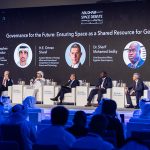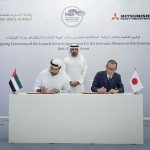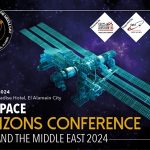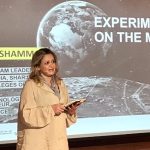UAE Space Agency to inspire youth to enter the space sector, support start-ups and build a national industry.
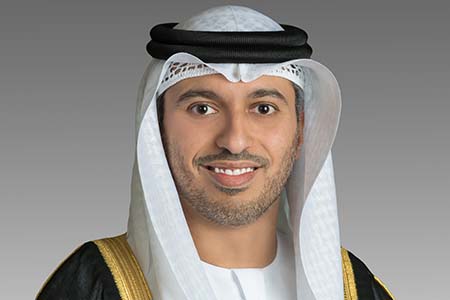
Abu Dhabi Sustainability Week (ADSW) 2019, held annually and hosted by Masdar, provided an opportunity for the UAE Space Agency to highlight its own role in remaining sustainable while participating in a number of space projects.
?Sustainability is inextricably linked to technological advancement and the development of advanced skills,? said His Excellency Dr. Ahmad Belhoul Al Falasi, Minister of State for Higher Education and Advanced Skills and Chairman of the UAE Space Agency, during the final day of the UAE Space Agency?s participation in Abu Dhabi Sustainability Week (ADSW) 2019. Throughout the week-long event, the Agency showcased the space sector?s significant contribution to sustainability and the development of diversified, knowledge-based economies.
The UAE Space Agency played a key role at the 11th edition of ADSW. Influential delegates from the Agency were involved in panel discussions, networking lunches, start-up hubs, and award ceremonies. The Agency delegation was led by H.E. Dr. Ahmad Belhoul Al Falasi, and included: His Excellency Dr. Eng. Mohammed Al Ahbabi, Director General of the UAE Space Agency; Dr. Mohamed Al Junaibi, Executive Director of Space Sector; Dr. Khaled Al Hashmi, Director of Space Missions, Science and Technology; Sheikha Al Maskari, Chief Innovation Officer; Eng. Naser Al Rashedi, Director of National Space Policy and Regulation; Sumaya Al Hajiri, Head of Space Policy and Regulations, and other officials and engineers from the Agency.
H.E. Dr. Al Falasi, participated in a panel entitled ?How investment in science drives the UAE?s long term sustainable development? with Her Excellency Sarah Al Amiri, Minister of State for Advanced Sciences, and Her Excellency Mariam Al Mheiri, Minister of State for Food Security. H.E. Dr. Al Falasi stressed the important role that youths play in sustainability, saying: ?The next generation is integral to meeting the sustainability targets that are laid out in the United Nation?s 2030 Agenda. Young people are innovative, passionate, creative and energetic. We need to harness and nurture these qualities with effective higher education and advanced skills programs.?
?The growth and development of the UAE?s space sector will directly contribute to excellence in education and a diversified, knowledge-based economy ? two of the key pillars on which the UAE Centennial Plan 2071, which was launched by H. H. Sheikh Mohammed bin Rashid Al Maktoum, Vice-President and Prime Minister of the UAE, is based,? added H.E. Dr. Al Falasi.
On the role of the exploration of Mars in capacity building, H.E. Dr. Al Falasi said, ?The UAE?s ambition to have a permanent settlement on Mars by 2117 has created a long-term objective that will encourage generations of Emiratis to take up science disciplines, in the process inculcating a culture of advanced knowledge, innovation and learning that will drive the UAE?s sustainable development.?
H.E. Dr. Eng. Mohammed Al Ahbabi, Director General of the UAE Space Agency, participated in a panel entitled ?Building Tomorrow?s Workforce Today? with Erin Winick, Associate Editor of Future of Work at MIT Technology Review, and Dr. Steve Griffiths, Senior Vice President of Research and Development at Khalifa University. The panel was moderated by Cailin Birch, the Global Economist at the Economist Intelligence Unit.
H.E. Dr. Eng. Al Ahbabi said, ?The UAE Space Agency is the first established space agency in the region, and is the largest in terms of investment and number of satellites. We try to utilize space to inspire, attract, educate, and train young people. We inspire the youth to pursue a STEM degree, as one of our mandates is to build human workforce capacity.?
In a discussion about how the workforce of the future could be impacted by machines, H.E. Dr. Eng. Al Ahbabi said, ?Satellites are robotic, and creating a satellite takes around three years and it is a very complex and sophisticated process. I think automation in the space industry is important for saving time and reducing cost, as space is a sector that requires a lot of money.?
H.E. Dr. Eng. Al Ahbabi added, ?I do not believe that automation and robotics will take over and I do not think that humans will become idle and unemployed. Satellites require humans to operate them and eventually we will see that more automation will help humans with a lot of work.?
During a panel entitled ?Bringing Space Tech Home?, Dr. Mohamed Al Junaibi, Executive Director of Space Sector, expressed his appreciation for the opportunity to be a part of a prestigious panel that included Carissa Bryce Christensen, Founder and CEO at Bryce Space and Technology, and Salem Al Marri, Assistant Director General of Science and Technology at the Mohammed bin Rashid Space Centre. Dr. Al Junaibi said, ?Our objective is to transform the UAE into a knowledge-based economy, in part through growing the space sector, which benefits humanity and contributes to sustainability. The UAE has the largest space economy in the region, and we are able to leverage what we have for the benefit of the UAE and the world.?
In addition, responding to a question about the particular uses of space technology in the UAE for the benefit of humanity, Dr. Al Junaibi said, ?In the UAE, we have a vital and diverse space sector which includes satellite companies like YahSat and Thuraya who provide communication services all over the world. Last year, YahSat launched its third satellite, and now it covers 60 million people across more than 140 countries. Some parts of the world that have not been connected before, like the Amazon region, are now connected to the whole world. The Mohammed Bin Rashid Space Centre (MBRSC) also serves as a great model for utilizing space for the benefit of humanity – it currently operates three satellites with a wide range of capabilities.?
ADSW also highlighted the significant role played by women in inspiring change and innovation, and their contribution to the development of a sustainable future. Sheikha Al Maskari, Chief Innovation Officer at UAE Space Agency, was a participant in the Women in Sustainability, Environment and Renewable Energy (WiSER) initiative at ADSW entitled ?The Role of Women in Advancing the United Nations? Sustainable Development Goals?. Al Maskari, along with her fellow participants, discussed how women can play a larger role through education, entrepreneurship and innovation, finance and policy, and culture/changing behavior, to advance the UN Sustainable Development Goals.
Al Maskari highlighted how women are underrepresented in STEM fields around the world, especially in the space industry. She shared some of the approaches that have been adopted to bolster the role of women in space, saying, ?We have developed engagement and capacity building programs, all of which are open to girls and women, which have been effective in minimizing the challenge of opportunity structures.?
?In order to combat some of the underlying grassroots issues facing women in space, we have also sought to raise awareness of space and build a culture of interest in the field,? added Al Maskari.
On another note, Eng. Naser Al Rashedi, Director of National Space Policy and Regulation, and Sumaya Al Hajiri, Head of Space Policy and Regulations, also joined key panellists in a session titled ‘How to Become a Sustainable UAE Space Program?, where the panellists discussed the importance of space investment, engaging youth, and building capacity.
Al Rashedi highlighted the importance of space investment in the UAE, saying, ?As the UAE Space Agency, we are working along with other players on finding ways to encourage investments in space, not just from governments, but from companies and individuals. We have communicated with stakeholders, investors, government entities, and universities, to discuss the importance of raising awareness to space companies who want to better understand the market needs. As well as enlightening customers who already have a lot of business about the breadth of space utilization opportunities, and having the right regulation to support investors in space.?
Numerous panels held at ADSW stressed the importance of involving youth in the space sector. This was also reinforced by including young adults in panels, during which they shared their inspirational experiences to encourage younger generations to get more involved in the space industry.
Dr. Muthanna Al Mahmoud, Head of Space Science and Technology at the UAE Space Agency, moderated a panel entitles ?Young Space Invaders? as part of the Youth for Sustainability hub. This panel involved three rising stars in the space sector, Alia Al Mansoori, Abdulla Al Marrar, and Mohamed Al Amri, who highlighted the importance of youth taking part in space, and how increasing numbers of young people are becoming interested in the space sector.
The panellists discussed the challenges that young people face in the space industry and stressed that the only way to face these challenges is by being passionate about space. This panel also highlighted the important role that the UAE leadership plays in supporting the space sector and encouraging young people to enter the industry. Finally, the panellists discussed the eclectic fields that space involves, which include, but are not limited to, engineering, physics, chemistry, biology, and astronomy.









































































